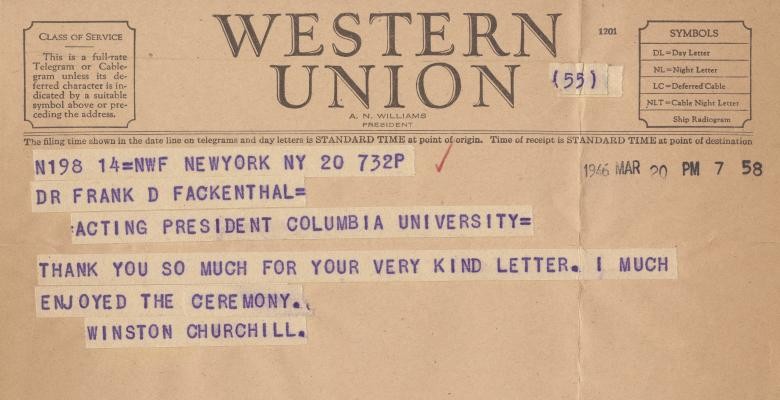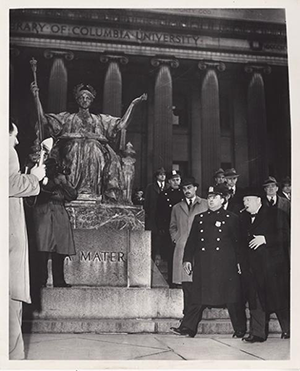Ask Alma's Owl: Winston Churchill's Honorary Degree

Dear Alma,
The New York Times recently wrote about the various busts of Winston Churchill in the White House. I know he often visited the United States. Did he ever come to Columbia?

Dear Amateur Historian,
Honorary degree recipients, or honorands in Columbia parlance, are masters in their respective fields. But occasionally, they are far more than that, as in 1946, when Columbia conferred an honorary degree on Winston Churchill, who had been prime minister of Great Britain when that nation was among the last holdouts to Nazi domination of Europe.
Two months after V-E Day in 1945, Churchill lost his reelection bid. That winter he made a long visit to the United States. Highlights of his itinerary included his famous “iron curtain” speech at Westminster College in Fulton, Mo., and a later visit to the Hyde Park, N.Y., grave of Franklin D. Roosevelt, his fellow wartime leader.
Columbia had voted in 1943 to award Churchill an honorary degree, but the war kept him in England. An offer was extended again, and in accepting Churchill wrote, “I thought myself bound not only by my promise but by my great regard for [Nicholas Murray Butler] to come forward and accept this remarkable honor.”
Churchill and Butler, Columbia’s president from 1901 to 1945, knew each other well. Butler, who won the Nobel Peace Prize in 1931 for his efforts to strengthen international law, referred to Churchill as “my old and valued friend” and the two corresponded.
Winston Churchill (right) smokes a cigar as he passes Alma Mater after receiving an honorary doctor of laws degree on March 18, 1946.
On March 18, 1946, a fleet of Oldsmobiles flanked by police on motorcycles drove up to the steps of Low Library. Churchill emerged from his car waving his homburg and flashing his famous “V” for victory sign. Police estimates put the crowd at 11,000, including several hundred anti-war picketers on Broadway who chanted “No more blood, sweat and tears,” The New York Times reported. A security detail of about 200 New York City police and several detectives from Scotland Yard watched over him.
Some 600 guests had been invited to the ceremony in Low Library Rotunda, and a public address system was installed to broadcast the event for those who couldn’t get in. Columbia requested a copy of Churchill’s text in advance for the press, but was warned, “Mr. Churchill often makes amendments and additions on the spur of the moment.”
In his speech, Churchill, who wore scarlet Oxford University robes, began by paying tribute to Butler, seated in the front row; newspapers had announced only days earlier that Butler had gone blind. “The light that burns within burns all the brighter,” he said. Churchill then praised American university life, where graduates “are numbered not by the millions but by the tens of millions.” He also spoke hopefully about Britain and America “marching forward together, [that] we may render at this juncture services to humanity which never before has any country had the honor to do.”
The degree itself was conferred on Churchill by Carlton J.H. Hayes, the Seth Low Professor of History and a former ambassador to Spain. Praising the honorand, Hayes said, “If one man saved civilization, and with it academic freedom, he is that man.”